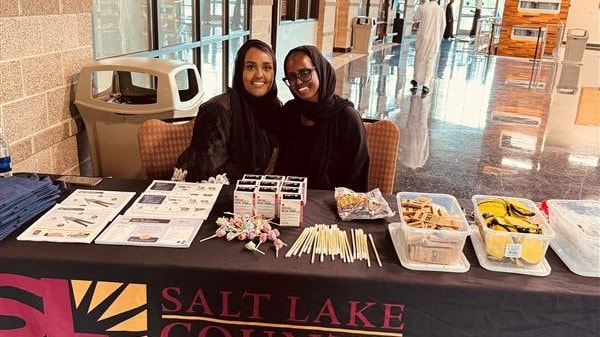At a glance
The Salt Lake County Health Department is one of 40 agencies funded by CDC's OD2A: LOCAL cooperative agreement to respond to the drug overdose crisis. In their own words, they describe their efforts to reduce health disparities through stigma reduction and education efforts among the Somali American community.

Salt Lake County
When our Salt Lake County Health Department (SLCoHD) team decided to apply for OD2A: LOCAL funding, we knew it was vital to continue working with community health workers and community-based organizations to have the reach we envisioned and to make our Overdose Data to Action (OD2A) work even more successful.
SLCoHD is fortunate to have a team of community health workers already working in the Population Health's Community Access, Resiliency, and Education Bureau. Upon receiving the OD2A: LOCAL award, we quickly interviewed our diverse internal community health workers and offered positions specific to OD2A work and their unique cultural perspectives. In addition to hiring community health workers, we extended offers to work with community-based organizations—trusted community partners and a bridge to sharing and communicating information between communities and SLCoHD.
Although Salt Lake County's population is primarily white, we are unique because we are a primary location for refugee resettlement in the United States, which allows us to serve individuals from across the globe. According to the U.S. Census Bureau, one in five Salt Lake County residents (21.8%) speak a language other than English at home. SLCoHD took a culturally and linguistically relevant approach to the work. We formed a Language Access Workgroup that includes people with lived experience of drug use, leaders from community-based organizations, and others to ensure that overdose prevention educational materials are created in multiple languages in culturally appropriate and relevant ways. Using a health literacy lens, SLCoHD staff are working to develop tailored educational materials about naloxone, opioids, and overdose that are translated into multiple languages.
During 2024, there were multiple opioid-related overdose deaths among young Somali men in Salt Lake County. We have a Somali community health worker, Halima, and a Somali health educator, Ayan, on staff who came to the U.S. as refugees and greatly understand Somali culture and what it means to be a refugee. Upon learning about the opioid crisis, they immediately wanted to work on a project specific to the Somali community. According to these two staff, speaking about drug use, overdose, and mental health are taboo in Somali culture. The Somali culture is also unique in that most information and communication to the Somali community needs to be disseminated through the imam (mosque official).[1, 2] Without approval from the imam, it is difficult to make an impact in the Somali community.
Knowing that the opioid crisis was directly impacting the Somali community, our community health worker, Halima, wanted to begin her approach to working with her community by having informal conversations with a Somali women's group. Cultural and religious social norms often make women feel more at ease discussing health concerns with other women. Halima finds it easier to discuss sensitive topics like opioids with other women based on their shared ethnic and religious backgrounds. This common ground creates trust and comfort, allowing for more open conversations about sensitive topics. Halima chose to first talk to the women's group, facilitating honest discussions about opioid use and overdose prevention.
Halima spoke with one of the group's organizers and got permission to attend and start the conversation. While the group initially hesitated to discuss the subject, Halima successfully met with five Somali women to engage in a meaningful conversation. During the discussion, Halima addressed the risks associated with opioid medications, including the potential for overdose. This prompted the women to open up and share their concerns about their parents' or their own use of these medications. They expressed a desire to receive more education on overdose prevention and the use of naloxone.
After another unfortunate overdose death in June in the Somali community, Halima and a health educator, Ayan, approached two local imams about the opioid crisis and its devastating impact on the Somali community. This conversation led to a greater understanding of the opioid crisis in Salt Lake County, and one imam invited Halima and Ayan to a celebratory event attended by over 200 community members. Halima and Ayan provided education, opened conversations, and answered questions about opioids, overdose, and naloxone. They distributed naloxone kits and provided instructions on how and when to administer the life-saving medication.

Drawing upon recent outreach and education successes, work will continue within the Somali community to further break down barriers, decrease stigma, and provide risk reduction and linkage to care within the Somali community. Halima shares, “As health advocates, we understand the importance of addressing sensitive topics like the opioid crisis with cultural understanding and trust. The growing impact of opioid-related issues within Somali communities across the country has encouraged Somali families here in Utah to start addressing this critical issue. Through our efforts to initiate conversations in women’s education groups and collaborate with religious and community leaders, we are breaking down stigma and creating pathways for education and access to life-saving tools like naloxone. Together, we are making meaningful progress and empowering our community to confront this crisis.”
